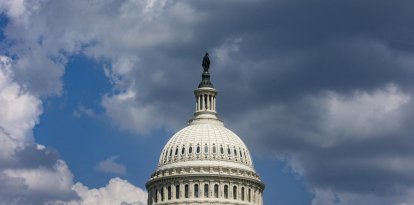Winter storm: more than 100 million people on alert as death toll rises
Kentucky Governor Andy Beshear described the flooding, cold and snow phenomenon as "a snowstorm in the middle of a natural disaster." Hazardous conditions will linger for the next several days.

Winter storm in central and eastern part of the country.
The deadly toll from winter storms continues to climb, nearing 20 in the past few hours. Strong winds, snowfall and rain that landed in the central and eastern parts of the country on Saturday continue and will continue for the next few days. This Wednesday, more than 100 million people were under alert for frigid temperatures.
Kentucky was the hardest-hit state, with 14 deaths. Governor Andy Beshear confirmed the toll: "These are children of God, people missed by their families and their communities." Beshear declared a state of emergency on Friday, the eve of the start of flooding that claimed most of the lives in the state. The White House followed suit, making FEMA resources available to the more than 120 counties in the commonwealth. Of those, 57 issued written or verbal disaster declarations.
The local National Weather Service (NWS) had anticipated that the major storm would pass through the region, westward to eastward, Tuesday night and early Wednesday morning. Although he predicted the snowfall would subside around noon, he warned drivers to "plan on slick road conditions" throughout the day.
"This is a snowstorm in the middle of a natural disaster," Beshear told a conference, alluding to a combination of flooding and snowfall. In fact, while the first recorded deaths were mostly due to rising water, the last two were the result of cold temperatures: "An adult female, an adult male, they appear to have been homeless, both appear to have died by hypothermia."
Deaths in other states
Flooding claimed three other lives in West Virginia. All were confirmed by McDowell County authorities to local media. Gov. Patrick Morrisey toured the area, assuring that what he saw was enough to convince him that "federal assistance is required." Morrisey declared a state of emergency in several counties in the state.
Another person died in Atlanta, Georgia, when a tree fell on his home early Sunday. One more died in Philadelphia, also from a collapsing tree.
Heavy snowfall over the weekend left ice and flash flooding in the Virginias, Alabama, Tennessee, Kentucky, up through the New England region and even parts of Canada. Warnings were issued in all and power outages were reported.
Tornadoes were spotted in Alabama, Mississippi and Louisiana. "Along the roadway, numerous trees were snapped or uprooted, along with at least 40 to 50 power poles snapped," the local NWS team described the damage from the last of three confirmed tornadoes in Macon and Tallapoosa counties.
State of emergency in North Carolina
North Carolina declared a state of emergency Tuesday. "We fully expect that the majority of our state will be impacted by winter weather in the coming days," explained Governor Josh Stein. What he "fear most": power loss and road conditions.
In the countdown before the snowfall, the state Emergency Management Service recommended stocking up on three days' worth of non-perishable food, water and medicine, as well as avoiding going outside and taking the wheel.
It also reported that, after impacting Tuesday night, the storm would linger into Wednesday. The northern part of the state would be the hardest hit area, with up to 9 inches of accumulated snow in some sections. In some areas, precipitation would last into Thursday. "Very cold temperatures will linger through the work week and into the weekend," they warned.
Forecast for the week: historic cold and heavy snowfall
The NWS described as "record" cold in the center of the country. "Through Friday, numerous daily records are expected to be broken across the Plains and Lower Mississippi Valley with some locations experiencing their coldest temperatures on record this late in the season," it reported Wednesday.
In the north-central part of the country, the thermometer could indicate temperatures as low as -60°F (-15°C). The cold temperatures could last there for several days, but will not be limited to the north: "Sub-zero wind chills are forecast to extend as far south as Texas, Arkansas, and western Tennessee and Kentucky".
This Wednesday, in addition, snowfall will move eastward. Movement that comes with a special warning for North Carolina: "Significant icing from freezing rain is expected in southeastern North Carolina, which could lead to power outages."

























